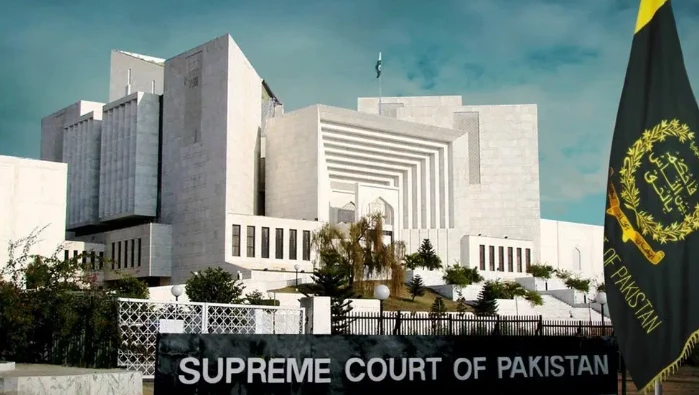Govt to review SC Procedure & Practice Act in consultation with judiciary, court informed

Stay tuned with 24 News HD Android App

The Supreme Court of Pakistan on Thursday adjourned the hearing of a raft of petitions against the Supreme Court (Practice and Procedure) Act, 2023 after it was informed that the federal government had decided to review the newly-enacted law, reported 24NewsHD TV channel.
Attorney General for Pakistan (AGP) Mansoor Usman Awan said the government wanted to revisit the legislation and this time it will introduce amendments in consultation with the judiciary.
An eight-judge larger bench comprising Chief Justice of Pakistan (CJP) Umar Ata Bandial, Justice Ijazul Ahsan, Justice Munib Akhtar, Justice Mazahar Ali Akbar Naqvi, Justice Muhammad Ali Mazhar, Justice Ayesha Malik, Justice Syed Hasan Azhar Rizvi and Justice Shahid Waheed conducted the hearing which was put off shortly after it commenced.
As the hearing was set into motion on Thursday, AGP Mansoor hurried towards the rostrum and said the law pertaining to the CJP’s suo motu powers dealt with several other aspects as well.
Referring to the Supreme Court (Practice & Procedure) Act, 2023 and the Supreme Court (Review of Judgements and Order) Act 2023, the AGP maintained: “We have two laws and both have similarities in the sections of review and hiring a lawyer.”
AGP Awan highlighted that the Supreme Court (Practice & Procedure) Act, 2023 was more extensive and included provisions related to the internal affairs of the court. “It is necessary to arrive at a solution regarding which of the two legislations can be relied upon,” he added.
CJP Bandial intervened, saying “We are happy that the government and the Parliament are bringing amendments to overlapping laws. The government should consult with the apex court when making laws related to the judiciary,” he observed, pointing out that sections 4 and 6 were similar in the review judgments law.
The CJP further remarked that the Parliament could be told to look into the harmonization of both the laws. “We welcome your proposal,” he added.
The AGP then said the legislation done on the top court’s administrative matters did not take into account the judiciary’s advice. “Amendments to the law will now be made with the Supreme Court’s consultation. Other than the legislations, advice will also be sought on other matters,” he added.
During the proceedings, the CJP said, “We found out through the newspaper that the Parliament has declined to share its record with the court but we have it. All the records are present on the Parliament’s website. We have taken the record from the Parliament’s website,” he added amusingly.
Reacting to the AGP’s remarks, Justice Mazhar said that it was important to see if the issue of similar laws could be solved. “If the laws are similar, it will be a waste of time to hear petitions regarding full court,” he said.
The AGP then proposed that the matter could be sent to the Parliament for discussion. However, CJP Bandial intervened, saying, “Don’t send it to the Parliament. We will look into it when the government or the Parliament gives advice regarding it.”
He then directed the AGP to seek instructions from the government and adjourned the hearing till next week. “An appropriate order will be issued later today,” the CJP added.
Justice Bandial also apologised to all the lawyers who had travelled to the apex court from Sindh and other areas. “The weather here is pleasant, we hope you will enjoy,” the AGP also said.
PML-Q response
Pakistan Muslim League-Quaid (PML-Q) Thursday pleaded with the Supreme Court to dismiss the petitions against the Supreme Court Practice and Procedure Act.
In its reply submitted to the Supreme Court, the PML-Q said that the act would increase, not decrease, the freedom of the Supreme Court.
“After the lawyers’ movement in the country, the opportunity for reforms was missed,” it pointed out.
“Section 4 of the act extends the jurisdiction of the Supreme Court. Section 3 of the act does not curtail the power of the Supreme Court under 184 (3). Section 3 requires the chief justice to use his power of taking suo motu notice along with senior judges,” it stated.
“The appointment of cases by the committee and the exercise of suo motu powers will increase the public confidence,” it added.
“Former chief justices namely Iftikhar Chaudhry, Gulzar Ahmed and Saqib Nisar used their powers proactively. The results of the exercise of their powers came in the form of Steel Mills, PKLI and Nasla Tower,” it pointed out.
“These consequences could have been avoided through legislation such as the Practice and Procedure Act,” it added.
“An independent judiciary means the performance of duties by every judge without restrictions, pressure and interference,” it stated.
Reporter: Amanat Gishkori
